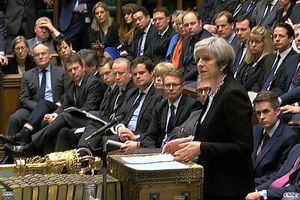Westminster terror attack: British-born attacker was investigated by MI5, says PM
The Westminster attacker has not been officially identified, but security services will face questions after it emerged that he was investigated previously by MI5.

Early indications suggest the perpetrator acted alone, and was inspired by "international terrorism". A massive inquiry has been launched with detectives focusing on his "motivation, preparation and associates".
MORE: ISIS claim responsibility as eight arrested
MORE: Westminster terror attacker named as West Midlands man Khalid Masood
MORE: Tributes as victims named as policeman, mother and tourist
Prime Minister Theresa May confirmed on Thursday that the attacker was British-born and was once investigated by MI5 in relation to concerns about violent extremism.
He was, she said, a "peripheral figure", the case was historic, and he was not part of the "current intelligence picture". Mrs May said there was "no prior intelligence" of his intent.
Nonetheless, officials will be braced for questions over what they knew about the assailant and decisions taken when he first appeared on the radar.
MI5 has come under intense scrutiny before - most obviously in the wake of the July 7 bombings in 2005.
On Thursday, the agency's Director General Andrew Parker confirmed its "operational response" is "fully mobilised".
Officers from the service, in collaboration with police counter-terrorism units, will be forensically examining the perpetrator's history as they attempt to gather as much intelligence as possible about his movements and communications in the weeks and days before the attack.
This work is likely to involve checking for any suggestion that he was in contact with known extremists either in Britain or abroad.
MI5 and GCHQ have a broad range of powers to mount investigations of electronic communications under the new Investigatory Powers Act, which passed into law last year.
Although police have stressed there is no specific information to suggest any further threat to the public, officers will also be on heightened alert for any copy-cat incidents or further attacks.
Police and MI5, supported by GCHQ, have been conducting an unprecedented and largely successful operation to contain the threat.
Intelligence agencies estimate there are around 3,000 potentially violent Islamist extremists in the UK, most of them British.
Counter-terrorism units are carrying out more than 500 investigations at any one time and say they have foiled 13 potential attacks in less than four years.
Security chiefs have called for the public to help in the effort by reporting any concerns.
In a major appeal launched earlier this month, Scotland Yard's head of counter-terrorism Mark Rowley described the contribution from members of the public as "extraordinary".
He said: "Even though the public are doing a great job, we want more help."
The disclosure after an attack that the perpetrator was known to authorities follows a pattern seen in other European countries hit by terrorism in recent years.
Security services in France, Belgium and Germany have all come under the spotlight in the wake of deadly atrocities in Paris, Brussels and Berlin.





